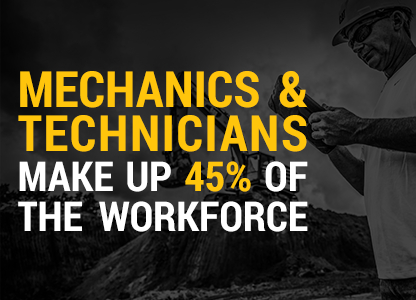
Heavy equipment technicians are a vital part of our economy. They service and repair Cat® equipment used to build roads, bridges and buildings. Few technicians today learn these skills. As a Cat technician and heavy equipment mechanic, you’ll have the opportunity to work with over 300 different types of Cat equipment. You’ll also be able to work with equipment in a variety of industries. Technicians can work for a heavy equipment, construction, agriculture, locomotion, or mining dealer. With their valuable skills, experienced Cat technicians can choose to work in a variety of different environments. Some technicians choose to work in repair shops, while others prefer traveling and choose to service machines in the field. You’ll need certain skills to get started as a heavy equipment technician/mechanic. This guide will help you learn more about what heavy equipment techs do and what skills they need to succeed. You’ll also learn how to get started.
Quick Facts
The following list offers statistics about a career as a heavy equipment mechanic/technician:
![]()
11% throughout the U.S.
![]()
High school diploma
![]() Recommended background in working on automobiles, watercraft, motorcycles (not required)
Recommended background in working on automobiles, watercraft, motorcycles (not required)
![]() Receive long-term on the job training
Receive long-term on the job training
Heavy equipment mechanics/Cat technicians are an essential part of the Cat dealership network. Besides diagnostic and mechanical repairs, technicians can be skilled at:
- Hydraulics
- Electrical
- Machining
- Fabrication
Today’s Cat equipment uses high tech electronic transmissions and hydraulics. Cat technicians/heavy equipment mechanics also use state of the art electronic diagnostic tools and computers when servicing equipment. More than 45% of the workforce at Cat dealerships is made up of mechanics and technicians.

Growing Need for Skilled Equipment Mechanics
Finding skilled heavy equipment mechanics can be a challenge. Few parents encourage their children to consider trade school. And most high schools prepare students for a four-year university, not trade or vocational programs. As a result, companies face a skills gap when they try to find qualified technicians. More than half of all workers in the trades are over 45, and few younger workers are joining the trades. In the next decade, jobs for heavy equipment technicians will grow by 11%. It is no surprise that mechanical trade skills are in demand throughout the U.S. The skills you’ll learn as a Cat mechanic are invaluable. Most heavy equipment technicians enjoy a good salary, job security and the satisfaction of being a vital part of America’s economy.

Enroll in a Degree Program for Heavy Equipment
More heavy equipment techs are seeking post-secondary schooling than ever before. Many companies prefer to hire technicians who have a certificate or associate’s degree. As a technician, you’ll enjoy a higher salary and more job security. Heavy equipment mechanics can obtain certificates or diplomas in equipment technology, applied science or science and technology. Look for programs that offer hands-on classes and are taught by professionals. These degrees will teach you how to test, diagnose, service and repair heavy equipment. Certificates in heavy equipment technology often require good mathematics and physical science skills. Students will learn electronics and computer skills as well. Most heavy equipment technology certificates and diplomas include a practicum, where students practice their skills in a supervised role.
Common courses include:
- Fuel systems
- Diesel engine technology
- Hydraulics
- Heating and air conditioning systems
- Electronics and diagnostic repair
- Engine maintenance
- Transmission repair
Preparing for a Degree in Heavy Equipment Technology
You can take courses in high school or through a community college to help prepare you for a heavy equipment technology degree. School for a heavy equipment mechanic is usually scientific and practical, so look for courses where you can learn these skills. The following list is a general guideline for courses and what they can offer:
- Technology and computer courses prepare you for the basics on computers and understanding electronics.
- Shop classes, especially welding and automotive repair, introduce the physical skills you’ll use as a Cat technician.
- Mathematics and science classes provide the strong science background you’ll need to understand engines, hydraulics and heating and cooling.
One way to get heavy equipment training is through a partnership with a heavy equipment dealer, like Quinn Company. We offer a partnership program through local colleges for new heavy equipment mechanics.
Opportunity is here
We can help you start your career as a heavy equipment mechanic/Cat technician. Through our ThinkBIG program, you’ll earn a degree and get experience as a mechanic or, if you’re a diesel mechanic with experience, apply to one of our job openings today! Contact Quinn Company to learn more about joining our Caterpillar Family.

